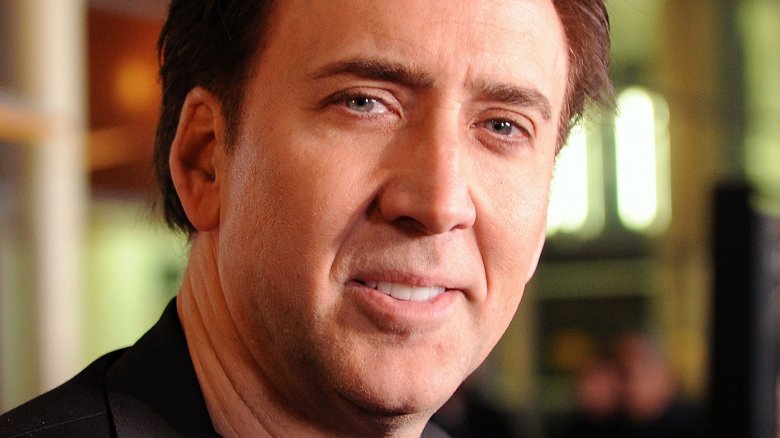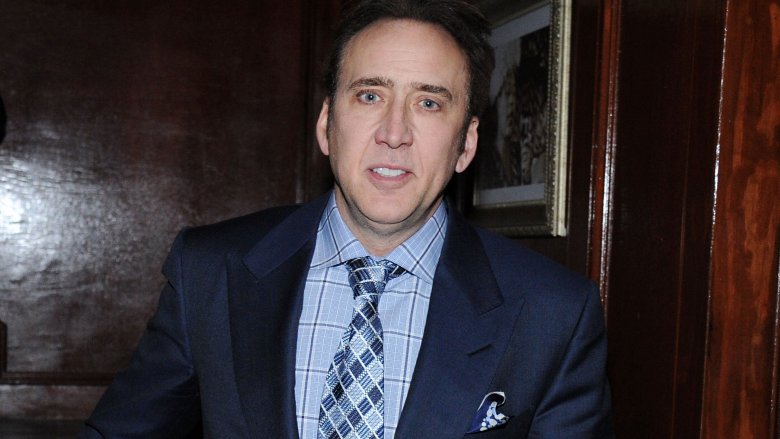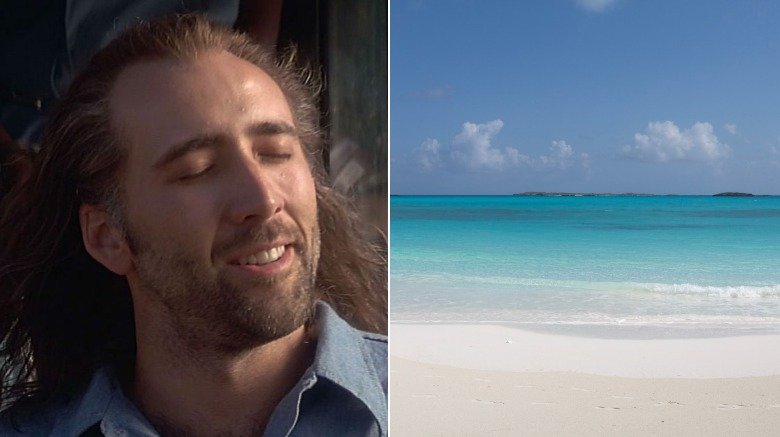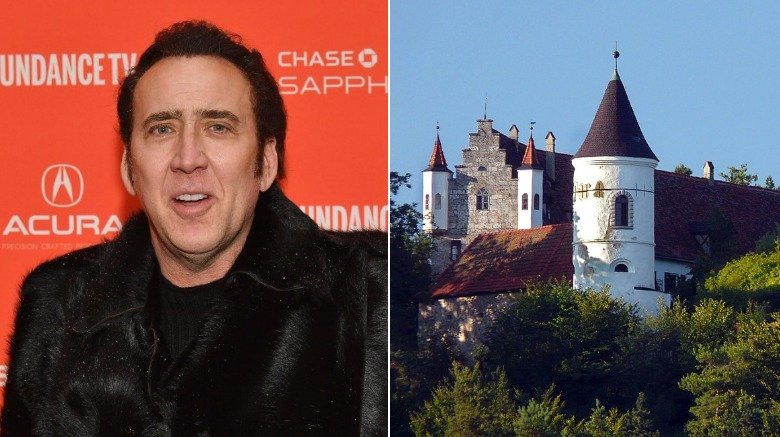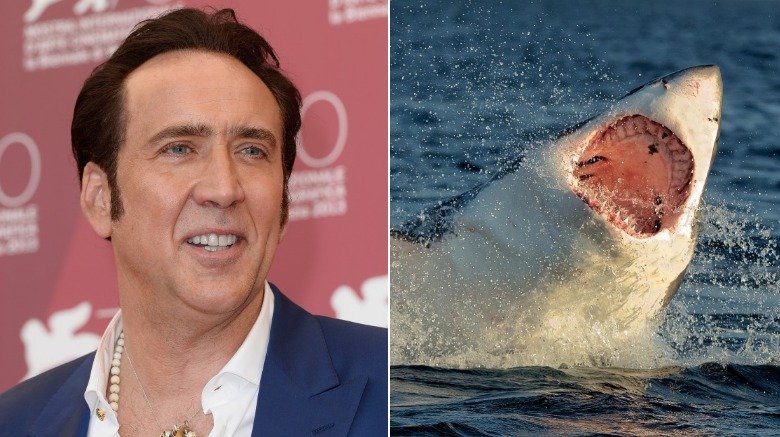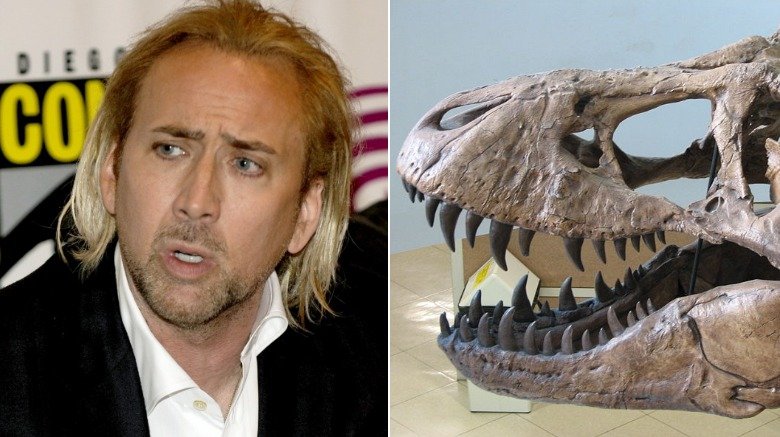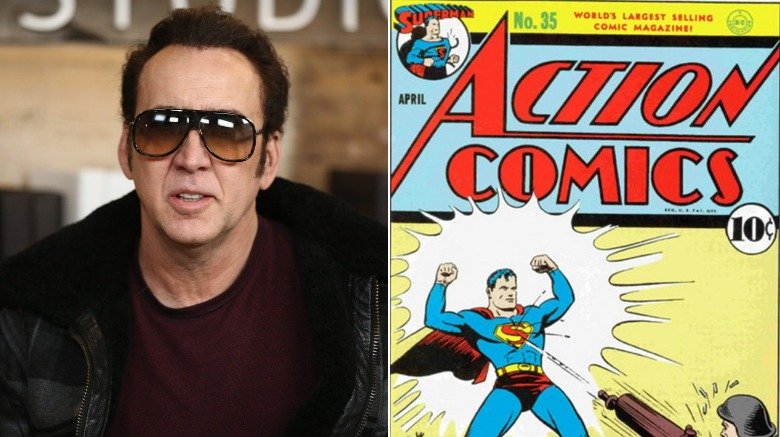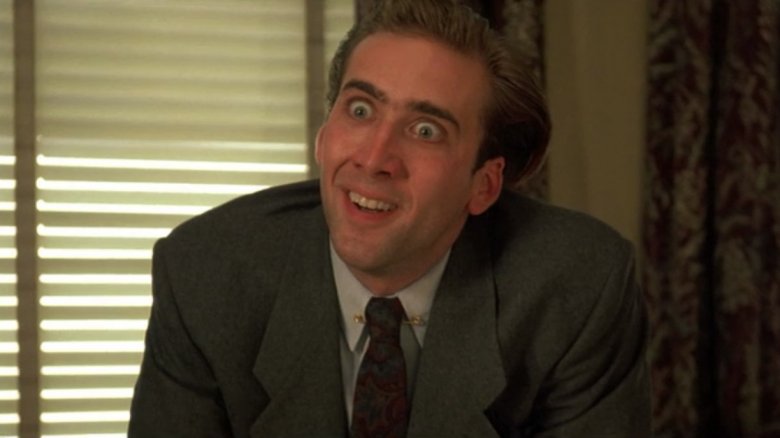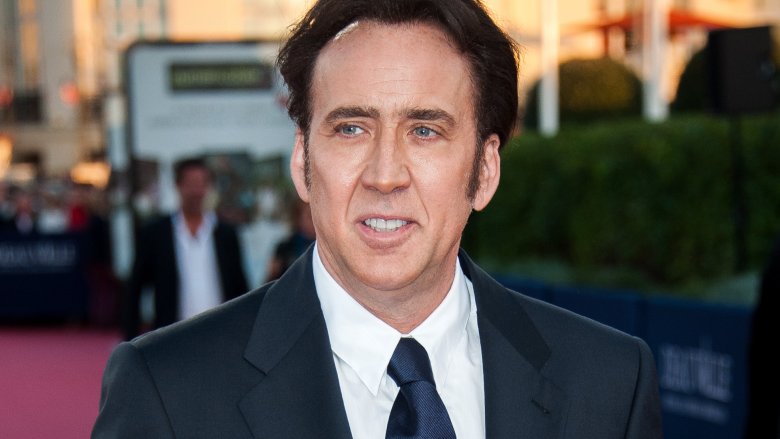How Nicolas Cage Lost His Fortune
Nicolas Cage is a man filled to the brim with eccentricity and expressiveness. His life reads like a plot from one of Hollywood's hammiest action blockbusters, which coincidentally, may be the reason he's made a career out of them. The star owned the most haunted house in America, bought a stolen dinosaur skull, woke up in the middle of the night to discover a naked trespasser eating a Fudgesicle in his bed, was bailed out jail by Dog the Bounty Hunter, and was victim to a multi-million dollar comic book heist that's going to become an actual movie. Oh, he also owned a shark and private island like some kind of comic book villain.
There's not a whole lot leading us to believe Cage's bizarre life isn't the result of him actually being a time-travelling vampire from the 1800s. The only evidence we have against it is the fact he never seemed to warn himself about squandering his $150 million fortune. Maybe he didn't want to ruin the space-time continuum. Who knows? Either way, somewhere between Cage's 50 cars, spattering of European castles, private island, and multi-million dollar mansions, he nearly lost it all. Today, he's worth just $25 million. Here's the true story of how Nic Cage's fortune was gone in sixty seconds (or a few years, for those of us grounded on Earth).
Vengeance: A Tax Story
You may not be familiar with Vengeance: A Love Story, the Nicolas Cage-led, VOD-release that's presumably so bad it doesn't even have an actual Rotten Tomatoes critics score. The truth is, love can't hold a candle to the vengeance doled out by the IRS. According to TMZ, Cage was slammed with more than $13.3 million in tax liens for unpaid taxes from 2002, 2003, 2004, 2007 and 2009, but the actor vowed to pay the cost in full.
"Over the course of my career I have paid at least $70 million in taxes," Cage told the tabloid. "Unfortunately, due to a recent legal situation, another approximate $14 million is owed to the IRS, however, I am under new business management and am happy to say that I am current for 2009. All taxes will be paid including any to be determined state taxes."
A cool $14 million seems like nothing for an actor once worth $150 million, but his former business manager Samuel Levin told TMZ in 2009 that star had to earn a minimum of $30 million a year just to stay afloat. When you look at the numbers, that seems overly ambitious. According to Yahoo, about half of his former net worth came from four films: Gone in Sixty Seconds, National Treasure, Snake Eyes and Windtalkers. But that was years ago. In other words, Cage had to find a national treasure or scale back.
He couldn't ghost ride out of foreclosure
Nicolas Cage may have won an Oscar for Leaving Las Vegas, but that doesn't mean he left Sin City of his own accord. The action hero unfortunately lost his Las Vegas mansion — and a slew of other properties — to foreclosure.
First, there were his two New Orleans properties. Naturally, one of them was allegedly "the most haunted house in America" because that's something the Ghost Rider star would absolutely need. (He told Event Magazine (via The Daily Mail) that he wanted to write "the great American horror novel," but shocker: he "didn't get too far"). According to CNN Money, these homes were worth a combined $6.8 million, and the "haunted" house was later featured in American Horror Story.
After New Orleans, the bank came for Cage's $8.5 million Vegas mansion. According to The Hollywood Reporter, it ended up selling in foreclosure for around $5 million in 2010. That same year, The Los Angeles Times reported that Cage lost his Bel-Air home, which opened at auction for $24.6 million less than the star's initial asking price. We're just guessing here, but the paltry price tag maybe had something to do with the decor, which one real estate agent speaking with the Times described as "frat house bordello." Which, let's be honest, sounds exactly like the kind of place Cage would live and a realistic title of one of his upcoming VOD releases.
There's no national treasure on this deserted island
Let's be honest: Nicolas Cage needs some place to hide his... national treasure, but we're not sure a deserted island in Exuma was it. Just ask anyone who went to Fyre Fest. Plus, the star already had a private beach estate in the Bahamas (although Bloomberg reported in 2016 that the property was in receivership, a legal maneuver that is generally part of a last ditch effort to avoid bankruptcy, according to Investopedia). If only the back of the Declaration of Independence had a road-map to good investments.
To be fair, Cage's island doesn't exactly seem like a bad investment on paper, except for the fact that $3 million is a huge price tag for some trees and sand. Variety reports that he tried to unload the 45-acre plot of undeveloped land for $7 million in 2008 amidst his IRS tax lien. Ultimately, it's unclear how much he got for the property, but it's a safe bet that it went straight to Uncle Sam. In case you happen to be a Bond villain looking for an new lair, Cage's tropical paradise was reportedly on the market for $8.5 million as of 2018.
Cage sued his business manager over financial ruin
This is one book of secrets Nicolas Cage probably wished he never opened. After the star was hit with a massive tax lien, he decided to sue his former business manager, Samuel Levin, over his dismal finances. According to CNN, the lawsuit claimed Levin "lined his pockets with several million dollars in business management fees while sending Cage down a path toward financial ruin." Cage asked for $20 million in damages.
Levin painted a completely different story. He claimed Cage was already "deeply in debt" when he was hired in 2001, and urged the Face/Off star to stop buying real estate and start creating a $10 million "cash cushion." The cushion was meant to help Cage avoid reputation-ruining roles. If he heeded the alleged advice, we might have never been left behind with the roller coaster of laughable acting and Christian propaganda that was... Left Behind. Levin reportedly also warned Cage against buying four yachts, a Gulfstream jet, a bunch of Rolls Royces, most of his 15 properties and "millions of dollars in jewelry and art." Hey, what Cage wants, Cage gets. Even if he has to rob the National Archives to get it.
TMZ reports that Cage eventually settled this lawsuit on undisclosed terms.
King of the $10 million castles
Nicolas Cage may be the reigning king of straight-to-DVD releases, but his castle proved to be a little too costly. Or rather, his two castles. According to Reuters, the Wicker Man star bought an 11th century Bavarian castle for an estimated $2.3 million in 2006. The following year, he reportedly purchased an 18th century English castle for around £5 million ($8 million if you consider the exchange rate at the time). According to his former business manager (via The Telegraph), the castles were "decrepit and needed huge expenditures." He allegedly put a whopping $4 million into the one in Germany, but only spent a single night there. In other words, it proved to be a poor investment. Can you blame him, though?
Cage had reportedly wanted to live in a genuine castle so badly that he once planned to ship one from Europe all the way to LA, according to CBS. They don't make homes like they used to and no one knows this more than a time-traveling vampire. (It should be noted, Cage denies he's a time-travelling vampire, but that's exactly what a vampire would say).
According to The Daily Mail, Cage was gunning to take a loss on the Midford Castle, which really put a damper on his hobby of "buying jam at the local farmers' market." Clearly, the dude's never been to a Trader Joe's.
He's had more exotic pets than a Bond villain
Nicolas Cage never got to play a Bond villain, yet somehow, so many of his purchases can't be explained otherwise. Who else owns a shark? Or venomous snakes? Some of the Dog Eat Dog star's most bizarre expenditures included a pet collection reads like a straight-to-DVD remake of We Bought A Zoo, but with none of the heartache. Instead, it's the kind of film where Cage goes on a magic mushroom trip with his cat (which is a totally real thing he admitted to doing on live TV).
According to The Daily Beast, the actor had a spattering of rare birds, lizards, and purebred dogs. He also had "two albino King Cobras." Much like someone living in his own Hollywood action movie, Cage allegedly hung the antivenom on a wall just in case the little noodles ever got nippy. According to other reports, he also purchased a $150,000 octopus, a crocodile, and a shark. There's no word on whether or not he used the shark or croc to guard the waters around his private island, but the answer is probably.
He spent $276,000 on a stolen artifact
What do a stolen dinosaur skull, a pyramid shaped crypt, and pygmy heads have in common? No, they don't have anything to do the latest Indiana Jones flick. Unfortunately, Nicolas Cage isn't even affiliated with Indiana Jones beyond a long-running Internet gag. These are just real-life things the Drive Angry actor spent his money on. When you have (had) $150 million, why not?
There's no denying that Cage was trying to amass a National Treasure of his own with all the weird artifacts he splurged on. We'd be hard-pressed to find out that the Declaration of Independence doesn't lead to one of his 15, previously-owned residences. Somewhere along the line of frivolous spending, Cage allegedly squandered his cash on a nine-foot-tall, pyramid-shaped burial tomb and a bunch of shrunken pygmy heads (we don't even want to know what you have to do to get one of those).
Strangest of all, Cage lost $276,000 on a 70-million-year-old dinosaur skull. According to The Guardian, the star outbid Leonardo DiCaprio for rare artifact in 2007, but was contacted by the Department of Homeland Security in 2014. Though he received a certificate of authenticity from the gallery, it turned out the Tyrannosaurus bataar skull was stolen — and it wasn't the first time. The gallery previously sold a smuggled dino skeleton linked to Eric Prokopi, a paleontologist known as a "one-man black market in prehistoric fossils." Cage has since returned the skull to the Mongolian government.
He was the victim of a bizarre comic book heist
If there's any more proof Nicolas Cage is a real-life action hero, he found himself at the center of a foiled multi-million dollar comic book heist. It's no secret that the star squandered a hefty chunk of his fortune on a multi-million dollar comic book collection. According to CNBC, the star purchased the first Superman comic ever for $150,000. Only around 100 copies are said to still exist.
Cage's ultra-rare copy of Action Comics No. 1 was lifted from his home in 2000. Another $150,000 wasted, or so we thought. According to The Hollywood Reporter, it was found eleven years later in an abandoned storage locker, and later sold for a cool $2.1 million, the highest price tag for a comic book in history. It is believed to have been sold on behalf of Cage, although that wasn't verified at the time. So okay, Cage may have actually profited from this outrageous purchase, but it was certainly the exception to the rule.
The story is so insane (and so patently Cage) that it was ultimately picked up by Lionsgate and transformed into a heist comedy. Action #1 doesn't yet have a release date, but we're crossing our fingers Cage doesn't disappear into a different dimension before then.
Sorry to burst your housing bubble
Nicolas Cage's real estate taste apparently draws influences from Raiders of the Lost Ark, Indiana Jones and Tomb Raider. A good action star has to learn from the classics, right? From the Egyptian-inspired detailing and velvet fabric lining his Los Feliz faux castle to his genuine European chateaus, the dude is known for his peculiar real estate picks. We'd call him a tycoon if it meant he made any money from his expensive hobby.
Unfortunately, Cage was hit particularly hard by the housing bubble burst. According to The Daily Beast, housing prices skyrocketed between 2000 and 2006 (around the time Cage amassed a huge chunk of his real estate) but crashed in 2008 (right before Cage was hit with a massive tax bill). According to The Street, the actor broke real estate's most sacred rule: "he bought at the top and sold at the bottom."
The ersatz real estate mogul ended up putting his New York apartment on the market at the height of the housing crash, the same year he tried to unload his Bavarian castle and lost his two New Orleans homes. One of his most gutting losses was a Newport, Rhode Island mansion he sold at a $9.5 million loss. That's not to say Cage never made anything on a real-estate deal. He once flipped a $25 million Newport Beach mansion for $35 million after a disturbing break-in soured him on the property.
He's clawing his way back with VOD
For a brief time, Nicolas Cage floated in the upper echelons of Hollywood glory with genre classics like Gone In Sixty Seconds. He took home the Academy Award for 1995's Leaving Las Vegas and was nominated for Spike Jonze's Adaptation in 2003. These days, the star has strayed away from Blockbuster success and found a comfortable home on the small screen with low-budget, VOD releases. These flicks allow the star to take greater artistic risks.
"They've managed to give these kinds of more challenging plots a chance to be viewed," he told The Los Angeles Times. "It gives them a place to exist in some way."
The truth is that most of Cage's extraordinary number of releases since his 2009 tax lien have been panned by critics. Left Behind, which was so poorly rated the first time around it's baffling anyone remade it, maintains a dismal 1% rating on Rotten Tomatoes. His 2012 project on which he served as a producer, A Thousand Words, hovers around 0%. Yet, he's still unafraid to move at an alarming pace. According to The Daily Beast, Cage "hasn't taken a single year off since 1981."
Cage still has some major wins peppered among the failures. The animated flick The Croods brought in a reported a reported $187.2 million domestic, making it one of his biggest hits since National Treasure, and 2018's Mandy, which was lauded by critics, helped restore his credibility one patented emotional outburst at a time.

